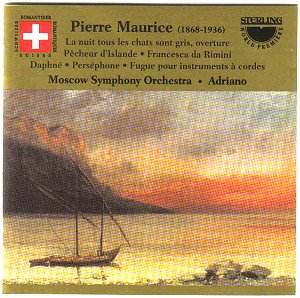Maestro Adriano has pulled more gems out of his
Mary Poppins bag of scores. On the Swedish-based Sterling label
the ever enterprising Adriano has again delved into the world
of rare composers to record six world premiere works from the
pen of Swiss composer Pierre Maurice. I have been unable to unearth
any significant information on Maurice or trace any recordings
of his works in the catalogue. Thankfully the comprehensive booklet
notes written by the conductor proved exceptionally informative.
The first work is the overture to the comic opera
La nuit tous chats sont gris (All Cats Look the Same in the
Dark). Maurice has crafted a brief work, light and lyrical
in style which quotes from the French song ‘Au clair de la lune’.
Pecheur d’Islande (Icelandic Fisherman) are
four musical impressions, based upon the celebrated book of the
same name by author Pierre Lôti, which would grace any concert
programme. A most attractive and dreamily atmospheric work with
prominent and effective use of the woodwind. This is a score that
could easily be mistaken for a work by a French composer.
Maurice’s symphonic poem Francesca da Rimini
uses a programme based on Dante’s poem La Divina
Commedia. The score is brooding and romantic not unlike works
by late-romantic Russian composers of thirty years earlier.
The attractive and atmospheric yet brief orchestral
prelude Daphne was Maurice’s first completed orchestral
work. Adriano’s researches have revealed little information other
than the composer has prefaced an episode after Ovid’s Metamorphoses
on the score by way of a programme.
Perséphone
Maurice’s two movement orchestral
suite, is a substantial score at almost thirty minutes duration.
The programmatic nature-suite is particularly colourful and extremely
finely orchestrated. Shortly following its composition several
Swiss and German orchestras took up the work which was also used
successfully as a ballet. Adriano holds the view that the Perséphone
’s
constantly changing episodes makes it more suitable for the
stage than the concert hall.
The final work on the disc is the Fugue for
string instruments which is a real jewel and it is amazing
that this work has not been recorded previously. Although
short in duration the work is beautiful and expressive, in a style
not unlike those that several English composers, such as Elgar
and Parry et al were composing at the time.
It is a travesty that these six scores have waited
up to one hundred years for their first recordings when far less
worthy works have been recorded in multiple. Clearly Maurice broke
no new ground with his compositions and quickly became a victim
of the new fashion as he was still composing music in the manner
of the earlier generation of Balakirev and Debussy whose influence
can be felt. Consequently his music swiftly moved into almost
complete obscurity. After eighty or so years we should now be
able to reassess Maurice’s music for its innate quality rather
than for the dynamic of the era in which it was written.
The Moscow Symphony Orchestra impress me more
each time I hear them on disc and when blended together with the
passion and expertise of their conductor Adriano they form a wonderful
partnership. Maestro Adriano is clearly at one with this rare
repertoire which he specialises in, adopting a consistently warm
and lyrical approach that aptly suits Maurice’s gift for colour
and lyrical expression. On the minus side the acoustics are not
perfect as the rather warm sound quality noticeably blurs at the
edges in the forte passages.
This release of expertly performed world premier
recordings of Pierre Maurice is thoroughly enjoyable and well
worth investigating.
Michael Cookson
